WAKAAZI WA MARSABIT WAONESHA MATUMAINI YA KESI ZAO KUKAMILISHWA HARAKA NA MFUMO WA AJS
November 22, 2024
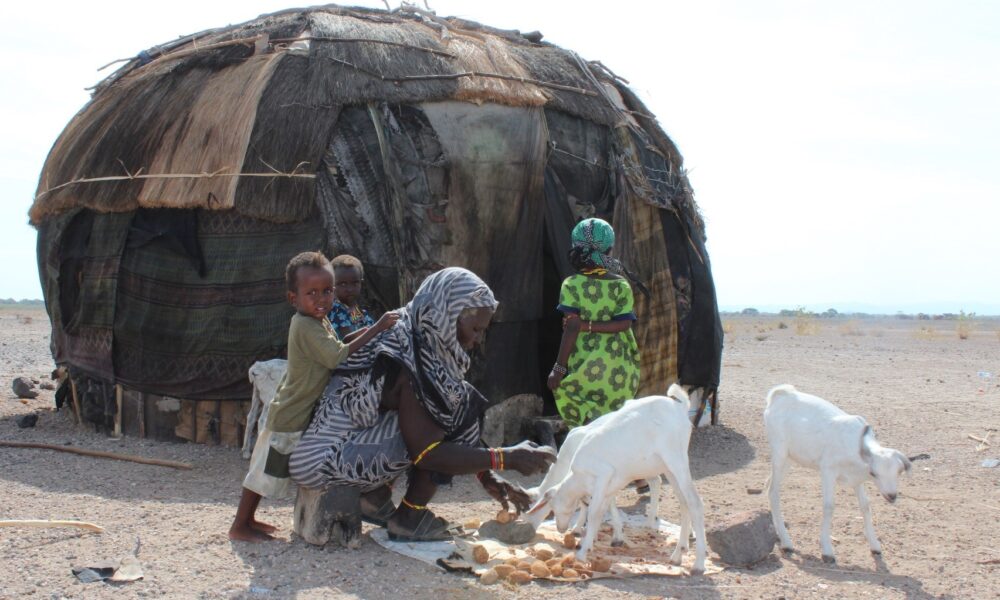
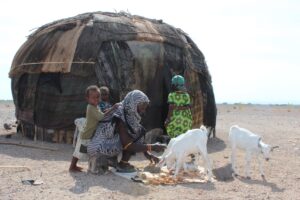
By Nangori Silvio.
The patterns of drought in Marsabit County have been changing drastically over the last decade. Here residents have literary experienced the direct impacts of climate change.
Marsabit experiences droughts frequently with more occurrences aggravated by environmental degradation.
In North horr Constituency, a place known as El-Isako Mala lives the communities whose survival remains compromised, by the effects of the hunger crisis.
The sun is very hot. The air is still and appears to amplify the intensity of the sun. The ground is sun-scorched and bare and the soil under foot as hot as a cooking oven.
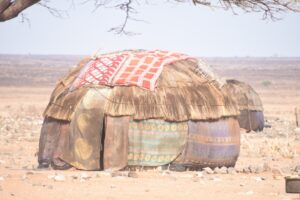
A manyatta at El-Isako Mala/Photo Nangori Silvio
Bad smell from the carcass of the animals swept away by the ongoing drought is scartered by the road side and under trees not far from the homesteads.
Dogs and Crows flying over the homesteads feeding on the animal Carcass.
There is no source of water around the place all that can be seen is dried old boreholes caused by the ongoing drought in the area that has forced a change of the old community lifestyle to another life that seems hard to accept for they only depend on pastoralism.
Few Kilometers off road in an open and vast land is homesteads with few people, some sleeping under a shade and others in front of their manyattas.
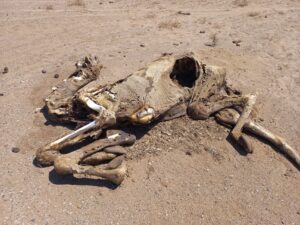
A camel Carcass dragged out of the manyatta after being hit by extreme drought/photo Nangori Silvio
From an old hurt is Shake Wario Huka, 60, with her three grandchildren sitting in front of their Manyatta at midday with stone at hand to break a wild fruit in order to feed her children and the young ones of a goat who are desperately waiting to grab their share.
‘Kone’ a Borana name for a Doum palm fruit found in the Hyphaene compressa tree which is one of the most common plants in El-Isako Mala region that has a potential to provide an alternative livelihood becomes rare to find as human beings, livestock and wild animals compete to feed on them due to the ongoing Drought.

Shake Wario with her Grandson and two granddaughters preparing Doum Palm fruit as a lunch time meal.
“We look for wild fruits known as ‘Kone’ in the bushes so that we can prevent hunger pangs both for our own consumption and the young ones of a goat, the fruits are bitter and a bit salty but at the moment we have no otherwise,” said Shake.
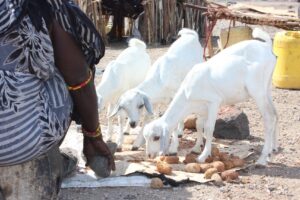
The goats waiting to grab their share of Doum palm fruit/Photo Nangori Silvio
Drivers of acute food insecurity in the region include the compounding effects of poor and erratic rainfall and desert locust infestation which was among the effects that worsened the situation in El-Isako Mala.
“I had my last meal three days ago. I am not sure of the next meal. There is no need to continue living in such a situation,” says Shake
“The situation is very dire and there is a need for an immediate response” she added.
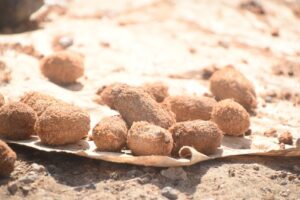
‘Kone’ Doum Palm Fruit found in El-Isako area/Photo Nangori Silvio
The frail, elderly man, 67, is at home—inside his dilapidated hut to be exact, Mr. Wario Huka who later explained that he was unable to sleep due to hunger
Is among thousands of pastoralists who lost their livestock in the escalating drought, Wario Huka the husband to Shake says that the wild fruits is the only thing that they survive with as food.
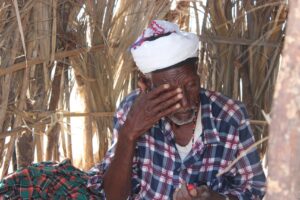
Wario Huka,67, inside his dilapidated hut/Photo Nangori Silvio
“I had 50 Sheep and goats but now they have all been depleted I don’t know how our life is going to be in the future, we only depend on our livestock for income and education for our children” said Wario.
He says that among the many sheep and goats he has only been left with 5 and they fear they might not survive the ongoing drought.
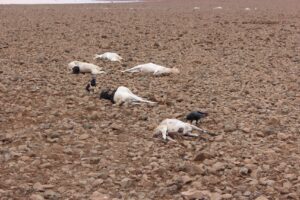
Drought causing deaths of animals at El-Isako Mala
“I can’t help but think about the future of these communities. Can El-Isako Mala’s remaining livestock and those of other pastoralists survive another drought? Will the seasonal rains ever return? ” he added.
Despite that there is a school a few kilometers from the Households children don’t go because of lack of food which the parents say that they lack concentration in school forcing them to go help in fetching water and Doum palm Fruit (Kone) in the dried Rivers about 7-15 kilometers.
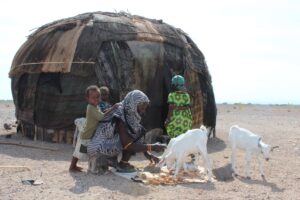
Shake Wario explaining about the dire situation with her grandchildren/Photo Silvio Nangori
“My grandchildren are just staying at home for now because of hunger that we don’t know how long it will last, its something we have never experienced the other years, this seems worst” Said Wario.
According to Isacko Jirma the Director Caritas Marsabit the situation is dire and alot need to be done to regulate the effects of famine in the region.
He said that there is no much support from the government in controling the situation.
“The area has experienced three failed rainfall seasons hence the situation makes community live in deprorable state. The community here depends on livestock entirely for their livelihoods therefore things now are worst” He said that when Caritas Marsabit visited the area to offer humanitarian aid.

Isacko Jirma the Director Caritas Marsabit during food distribution Programe in North Horr Marsabit County/Photo Samuel Kosgei
It is estimated that nearly 200,000 people in the whole county are in need of humanitarian aid.